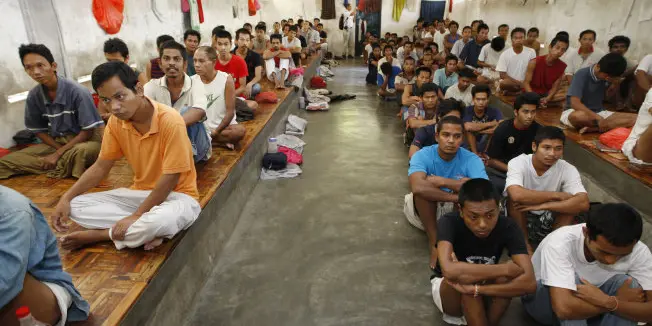
Trafficking Fuelled by Demand for Cheap Workers and Government Complicity
May 14, 2015

By Charles Santiago
APHR Chairperson
Malaysian Member of Parliament
It’s almost like every time our ministers or officials gloss over an issue, it comes back to haunt them. Case in point is the shocking discovery of mass graves in Padang Besar.
Everyone knows Malaysia is a destination of choice for the Rohingya refugees fleeing persecution and violence in their home country, Myanmar. And yet, Malaysia denied mass graves or camps set up by people traffickers were located here, when Thai authorities found similar mass graves in the Thailand-Malaysia border.
The Mingguan Malaysia reported that these graves were found in forests in mid-May and that the government kept it under wraps.
According to the law, Malaysia has a duty to protect and house victims of trafficking, who number in the tens of thousands. So maybe Malaysia’s denial is to shirk this responsibility.
This has to stop now.
The government must seriously look at the systemic reforms and strategies that must be put in place to curb the trafficking trade. And there must also be regional cooperation between the ASEAN member countries as well.
I call this a trade because millions are being made transporting human bodies, forcing them to fork out huge sums of money, bidding on them, selling them to the highest bidder, dumping them in the sex trade, or sealing their fate as bonded laborers.
In order to stop traffickers from preying on innocent victims, countries like Myanmar must stop targeted killings of Rohingya and instead give them protection. It must also allow them to work.
Other countries, like Bangladesh, must ensure jobs are made available and adequate measures are implemented to help the country’s poor live, with enough food, clothing, access to healthcare, and other basic necessities.
Once respective governments can look into these factors, their people will stop fleeing.
Then Malaysia and other Southeast Asian nations must look at weeding out corruption amongst its officers in uniform, particularly immigration officials.
It’s an open secret that immigration officers are on the take from traffickers and even from fleeing refugees or desperate migrant workers.
It’s not just the Malaysian government. We, as a nation, must also shoulder the blame for those who would have died of starvation, terror, and in grief in these camps. For decades, we have allowed thousands of Rohingya refugees and migrant workers to cross the border into our country to work as cheap laborers.
We ourselves, or someone we know, would have had undocumented migrant workers as domestic help. And yes, they would have been only too happy to retain their passports and not allow these migrant workers to leave their homes.
So we, too, can do our part in curbing trafficking by not creating a demand for cheap, exploited workers or paperless domestic helpers.
Trafficking is an ugly trade that robs people off their dignity and right to live. It unleashes terror and unspeakable violence against these people, particularly women and children.
The discovery of the graves at Padang Besar and Wang Kelian clearly shows that trafficking is happening in our backyard. And many Malaysians are working this trade.
Instead of sweeping this issue under the carpet for fear of international outcry, the Malaysian government must look at durable ways to curb this dizzyingly complex industry, which has a strong network among all ten ASEAN countries.
ASEAN Parliamentarians for Human Rights (APHR) was founded in June 2013 with the objective of promoting democracy and human rights across Southeast Asia. Our founding members include many of the region's most progressive Members of Parliament (MPs), with a proven track record of human rights advocacy work.